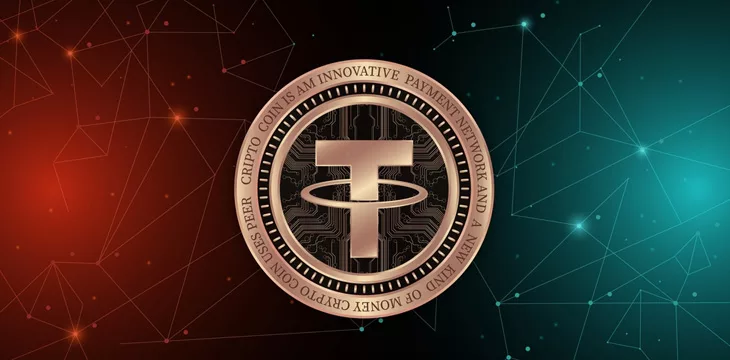|
Getting your Trinity Audio player ready...
|
Tether’s sudden willingness to comply with long-ignored economic sanctions strongly implies that the U.S. federal authorities are preparing to announce a criminal plea agreement with the world’s largest stablecoin issuer.
Over the weekend, Tether unveiled its ‘New Policy to Strengthen Ecosystem Security,’ aka its abrupt decision to “initiate a new voluntary wallet-freezing policy designed to combat activity connected with Sanctioned persons on the Office of Foreign Assets Control (OFAC) Specially Designated Nationals (SDN) List.”
Tether simultaneously froze 161 wallets on the Ethereum blockchain, although 150 of these contained no USDT stablecoins at the time (the wallets might contain USDT on some of Ethereum’s many Layer 2 chains). The remaining 11 addresses held a total of 3.5 million USDT, all but 100,000 of which were held in a single wallet. Blockchain sleuth ZachXBT
identified this whale wallet as a recipient of assets obtained via the hack of the Stake.com betting platform earlier this year.
One of the 11 wallets held a mere 16¢ worth of USDT but had transmitted over 400,000 USDT the day before the wallet was frozen. That’s either extremely fortunate timing, or someone somehow understood that the big chill was imminent.
Tether’s announcement contained its now-standard multiple uses of the word ‘proactive’ to describe its actions. In reality, Tether appears to have been coerced into belatedly acting shortly after it announced having “recently onboarded the United States Secret Service into its platform and will be working with the Federal Bureau of Investigation to do the same.”
Remember that it was well over a year ago that Tether declared that it was under no obligation whatsoever to freeze “secondary market addresses that are published on OFAC’s SDN List or that are operated by persons and entities that have been sanctioned by OFAC.” This included addresses linked to the coin mixer service Tornado Cash, which OFAC sanctioned in August 2022, and blacklisted Ethereum addresses linked to its use.
Two weeks after those sanctions were announced, Tether claimed to be ‘awaiting law enforcement instruction’ on how to respond. Tether further claimed that “unilaterally freezing secondary market addresses could be a highly disruptive and reckless move” because it “might interfere with ongoing and sophisticated law enforcement investigations.”
Meanwhile, Tether recently (and quietly) updated its Terms of Service to add “the Government of Venezuela” to its existing prohibition on U.S. and Canadian customers using Tether’s services. Over 110 Venezuelan citizens and eight entities were under SDN sanctions as of November 1, although the U.S. government reached an agreement with Venezuelan President Nicolás Maduro in mid-October to reauthorize certain prohibited transactions. (Maduro almost immediately began threatening to invade neighboring Guyana, prompting a rethink of this agreement.)
So what happened to push Tether to (pro)act in such a “highly disruptive and reckless” fashion?
A crackdown with no upside
It hasn’t gone unnoticed that Tether’s newfound chumminess with the Secret Service and Federal Bureau of Investigation (FBI) came hot on the heels of the record $4.3 billion settlement the Binance digital asset exchange and its founder Changpeng ‘C.Z.’ Zhao reached with the U.S. Department of Justice (DOJ) and other federal agencies last month.
Binance’s settlement was preceded by years of reports that the feds had lost patience with C.Z.’s indifference to regulatory compliance. The feds particularly took issue with his willingness to look the other way while criminals, sanctions evaders, and terrorists used his exchange to help fund their nefarious activities.
Tether has long been the subject of similarly unflattering reports, but the connections between USDT and terror groups responsible for the October 7 attacks on Israel appear to have lit a fire under federal agencies to curtail Tether’s historically hands-off approach to compliance.
Then there’s Wally Adeyemo, Deputy Secretary of the U.S. Treasury Department—OFAC’s parental unit—who recently asked Congress to authorize additional tools and resources to help crack down on digital asset bad actors. That request singled out “dollar-backed stablecoin providers outside the United States” that Adayemo said were “using our currency without the responsibility of putting in place procedures to prevent terrorists from abusing their platform.”
Adayemo’s request was followed by the introduction of new bipartisan legislation aimed at sanctioning “foreign parties that facilitate financial transactions with terrorists.” While passing any legislation in this current Congressional session is a long shot, the current anti-terror sentiment could give these efforts a nudge toward the finish line.
The proposed Terrorist Financing Prevention Act would allow U.S. authorities to go after ‘foreign digital asset transaction facilitators’ aka any entity or individual that “controls, operates, or makes available a digital asset protocol or similar facility, or otherwise materially assists in the purchase, sale, exchange, custody, or other transaction involving an exchange or transfer of value using digital assets” that helps finance terrorist activities.
There is a major caveat here, in that facilitators must ‘knowingly’ facilitate transactions with terror groups or those flagged by OFAC. As ever, Tether will argue that it just mints USDT much as the Treasury prints dollars and bears no responsibility for what happens afterward.
But USDT and other dollar-denominated stables have effectively become counterfeit dollars that offer sanctioned individuals opportunities to evade responsibility. As a 2022 indictment of five Russian nationals demonstrated, sanctioned oligarchs were able to trade for Venezuelan oil using USDT. One of the indicted Russians noted that USDT “works quick like SMS … It’s quicker than telegraphic transfer, USDT. That’s why everyone does it now. It’s convenient, it’s quick.”
Russia Russia Russia
Speaking of Russia, a Cointelegraph article posted last week (then almost immediately deleted) shone light on a new Russian cross-border payment network that uses USDT. The article (archived here) linked to a Telegram post by Russian digital settlement platform Exved, a self-described “electronic counterparty search system” that aims to “help Russian legal entities make cross-border payments without intermediaries.”
While claiming to work only with “legal entities in compliance with [anti-money laundering/combating the financing of terrorism] procedures,” Exved highlighted the use of USDT alongside actual U.S. dollars and non-resident rubles.
Cointelegraph quoted InDeFi Smart Bank CEO/co-founder Sergey Mendeleev saying Exved had the approval of both the Bank of Russia and the Russian Federation’s Federal Financial Monitoring Service.
If Mendeleev’s name sounds familiar, it’s because he also founded the Moscow-based Garantex digital asset exchange, which blockchain analysts Chainalysis claimed “accounted for the majority of sanctions-related transaction volume between 2022 and 2023.”
In 2022, Garantex was sanctioned by OFAC for its “wanton disregard for regulations and compliance” and its tendency to “willfully disregard anti-money laundering and countering the financing of terrorism (AML/CFT) obligations and allow their systems to be abused by illicit actors.”
Cointelegraph hasn’t yet offered an explanation for why it deleted its article, but one can easily understand why the newly OFAC-observant Tether wouldn’t want its product associated with such a prominent OFAC-sanctioned individual/entity. Another sterling example of Tether being ‘proactive’ about its more unsavory affiliations?
Coinbase doubles down
While Tether is furiously trying to disassociate its products from entities/individuals on the OFAC naughty list, the same can’t necessarily be said for the U.S.-based Coinbase
(NASDAQ: COIN) exchange.
Coinbase is one of the largest Ethereum validators, aka the ETH whales, who oversee the blockchain’s proof-of-stake consensus mechanism. According to the Tornado.pics site that tracks transactions linked to OFAC-flagged Tornado Cash addresses on Ethereum, Coinbase ranks second on the list of entities still validating Tornado Cash transactions, far fewer than the Lido Finance staking platform but far more than Binance.
Coinbase’s philosophical rejection of the OFAC sanctions against Tornado Cash is no secret, as Coinbase financially supported some Tornado Cash users in a legal challenge of OFAC’s decision last year. That lawsuit was dismissed in August, but the users appealed this decision to the Fifth Circuit Court of Appeals, with Coinbase continuing to provide financial support.
The Fifth Circuit has become notorious in recent years for issuing rulings that make little to no legal sense, seemingly more focused on whether they annoy Democratic officials. With that in mind, it’s possible that the Fifth Circuit justices will side with the Tornado Cash users. But the Treasury will undoubtedly appeal the ruling to the Supreme Court, which appears increasingly annoyed with having to unravel the Fifth Circuit’s often-tortured reasoning.
While this messy process unfurls, Coinbase may be blowing a lot of the goodwill that members of Congress have so far demonstrated toward it. With much of D.C.’s “crypto” ire currently focused on international scofflaws like Binance, Tether, and Justin Sun, the likes of Coinbase and Circle (issuer of the USDC stablecoin) have been the primary beneficiaries. (This sentiment has provided much of the fuel that allowed Coinbase’s cellar-dwelling share price to nearly triple in just the past six months.)
But given the new federal focus on eliminating crypto-based terror financing, Coinbase’s support for Tornado Cash—and the latter’s embarrassing links to North Korea—could leave a bad taste in Congressional mouths. As could Coinbase’s ill-advised decision to add USDT to its token roster, which led to the awkward revelation that USDT accounted for 15% of all trades in Q3 of this year.
Coinbase (and Circle) shouldn’t think they can forever rely on noncompliance being overlooked due to their home-field advantage. As Patrick Mahomes learned Sunday night, you can yell at the refs all you want, but if you were lined up that far offside, you’re going home a loser.
Follow CoinGeek’s Crypto Crime Cartel series, which delves into the stream of groups—from BitMEX to Binance, Bitcoin.com, Blockstream, ShapeShift, Coinbase, Ripple, Ethereum,
FTX and Tether—who have co-opted the digital asset revolution and turned the industry into a minefield for naïve (and even experienced) players in the market.

 03-31-2025
03-31-2025 





